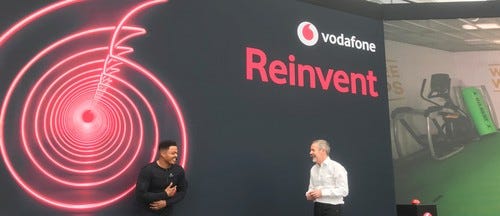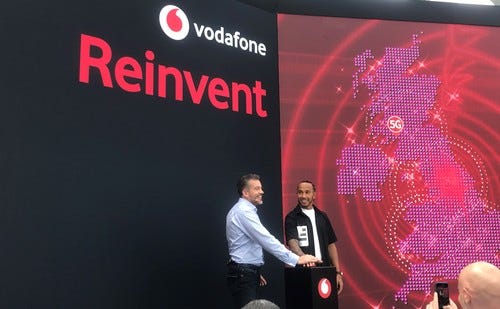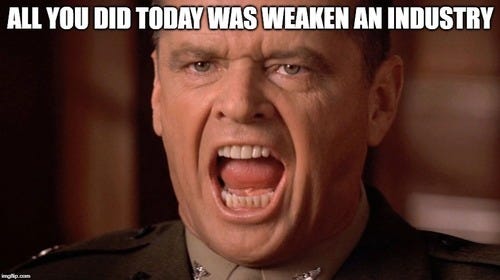
Beaten to a 5G launch by fierce rival BT, Vodafone needed a muscular response. Enter international rugby player Juan de Jongh, wearing a 5G-connected "haptic" suit that allowed him to feel the impact of a tackle made 100 miles away. If that weren't enough sports glamor at the UK operator's 5G launch in central London this morning, Formula 1 champion and speed junkie Lewis Hamilton hit the red button that symbolized the ignition of the superfast mobile service. Parked noticeably outside the venue, a mobile coffee shop bearing BT's EE brand seemed like a cheeky pitch invasion at an all-stars event.
Vodafone's 5G offering has clearly grabbed attention. Beyond the details of the technology, which had already been widely publicized, the headline announcement is the move to "unlimited" deals. Customers have grown used to paying for a monthly data allowance in the 4G era. Vodafone is promising an all-you-can-eat service, and at extremely competitive rates. For just £30 ($38) a month (on a SIM-only deal), subscribers will get as much data as they want at the highest speeds available. Vodafone's rivals may be trembling.
Figure 1: This 5G Packs a Punch  South African rugby star Juan de Jongh (left) feels the impact of a tackle on a training bag 100 miles away, while Scott Petty, Vodafone UK's chief technology officer, looks on.
South African rugby star Juan de Jongh (left) feels the impact of a tackle on a training bag 100 miles away, while Scott Petty, Vodafone UK's chief technology officer, looks on.
In the short term, the revolutionary unlimited move could certainly boost Vodafone at the expense of mobile brands like Three, the smallest of the UK's four mobile network operators. "This is in sharp contrast to its traditional premium-focused approach," said Kester Mann, the director of consumer and connectivity research for analyst firm CCS Insight, in emailed comments about Vodafone's 5G launch. "It could spell bad news for Three, which has built a strategy based on challenging industry norms." If marketed in the right way, unlimited could be a powerful acquisition tool, he says.
But selling unlimited 5G services at knockdown rates will also fuel concern about the value of the next-generation technology for service providers. Vodafone's entry-level "unlimited" 5G service (which delivers only 2 Mbit/s) costs £23 ($29) a month, just £1.90 ($2.40) more than it made from an average contract customer in its most recent financial quarter. And if its aggressive move initially translates into customer gains, rivals such as BT and Three will eventually respond.
Figure 2: 5G Is in the Air  Vodafone CEO Nick Jeffery (left) and Formula 1 race car driver Lewis Hamilton hit the button.
Vodafone CEO Nick Jeffery (left) and Formula 1 race car driver Lewis Hamilton hit the button.
"The lack of a price premium for 5G seems like a race to the bottom," says James Crawshaw, a senior analyst with Heavy Reading (a sister company to Light Reading). The expectation of Vodafone UK CEO Nick Jeffery that a return on investment (ROI) will come partly from winning more customers portends a "bloodbath" in a saturated mobile market, says Crawshaw. Vodafone also expects an ROI from cross-selling other services, such as home broadband. But that could be done without 5G, notes the Heavy Reading analyst.
Quizzed by reporters about 5G ROI, Jeffery insisted "nothing we've announced today is not profitable." That is partly because 5G is a much more cost-efficient technology than 4G, he said. But any argument that cost-per-bit efficiency will significantly boost margins looks ropey. For one thing, estimates of the impact have varied widely. Scott Petty, Vodafone UK's chief technology officer, anticipates a four- to five-fold improvement, he said at today's event. Yet Just 18 months ago, Johan Wibergh, the chief technology officer of Vodafone Group, reckoned 5G would be ten times as cost efficient as 4G.
LOL at the @EE contingent hanging around outside the @VodafoneUK #5G launch. Never ones to miss a trick... pic.twitter.com/OCbXavXPY5
— Dan Grabham (@dangrabham) July 3, 2019
Even at the upper level, this improvement seems unlikely to make a huge difference to overall operating costs. The 4G networks in widespread use today were similarly touted as a far more spectrally efficient option than earlier 3G networks. And yet the margin for earnings (before interest, tax, depreciation and amortization) at Vodafone Group has risen just two percentage points during the 4G era, from 29.9% in the fiscal year before Vodafone UK's 4G launch to 31.9% in the last one. Labor costs and other overheads account for the bulk of operating expenses, and only through sharp headcount reductions or the sale of real estate will operators really shift the needle. The best Vodafone can probably hope for is that 5G allows it to cram more data into its pipes without risking any cost spike.
Want to know more about 5G? Check out our dedicated 5G content channel here on
Light Reading.
At the same time, though, 5G will necessitate huge investments in new network equipment. One independent estimate is that it will cost four times as much to build nationwide 5G networks as it did to roll out 4G. New 5G spectrum licenses will add to the bill. Vodafone Group expects to maintain capital intensity (capital expenditure as a percentage of revenues) at the mid-teens level, but this implies 5G rollout may be a long and painful process. Unlike BT, Vodafone has not indicated how many 5G sites are in operation, or how many it will have this time next year. It has a 5G presence in just seven UK cities today and is targeting 19 by the end of the year, is all the company has said.
Other experts have mixed feelings about today's launch. "This should appease investors but the consumer business model for 5G is still unproven and further investment is needed to roll out costly 5G networks," said Paolo Pescatore, a tech, media and telecom analyst with PP Foresight. Vodafone's share price closed 2.07% higher on the London Stock Exchange today, after the unlimited move took markets by surprise. But it has lost 15% of its value since the start of the year.
Figure 3: 
The big problem is that -- despite the haptic suits and razzmatazz -- 5G still doesn't seem very revolutionary. Its real attraction lies in its potential to support entirely new and more demanding applications, such as virtual reality gaming or automated factory systems. Vodafone is promising an edge computing service next spring that might really excite investors and deliver the boost telecom needs. All that will depend on the details of the service, and whether it looks like something that might fend off the Internet giants instead of just bashing the traditional rivals. What Vodafone announced today may have buoyed an individual company but weakened an industry.
Related posts:
— Iain Morris, International Editor, Light Reading
Read more about:
EuropeAbout the Author(s)
You May Also Like




_International_Software_Products.jpeg?width=300&auto=webp&quality=80&disable=upscale)







